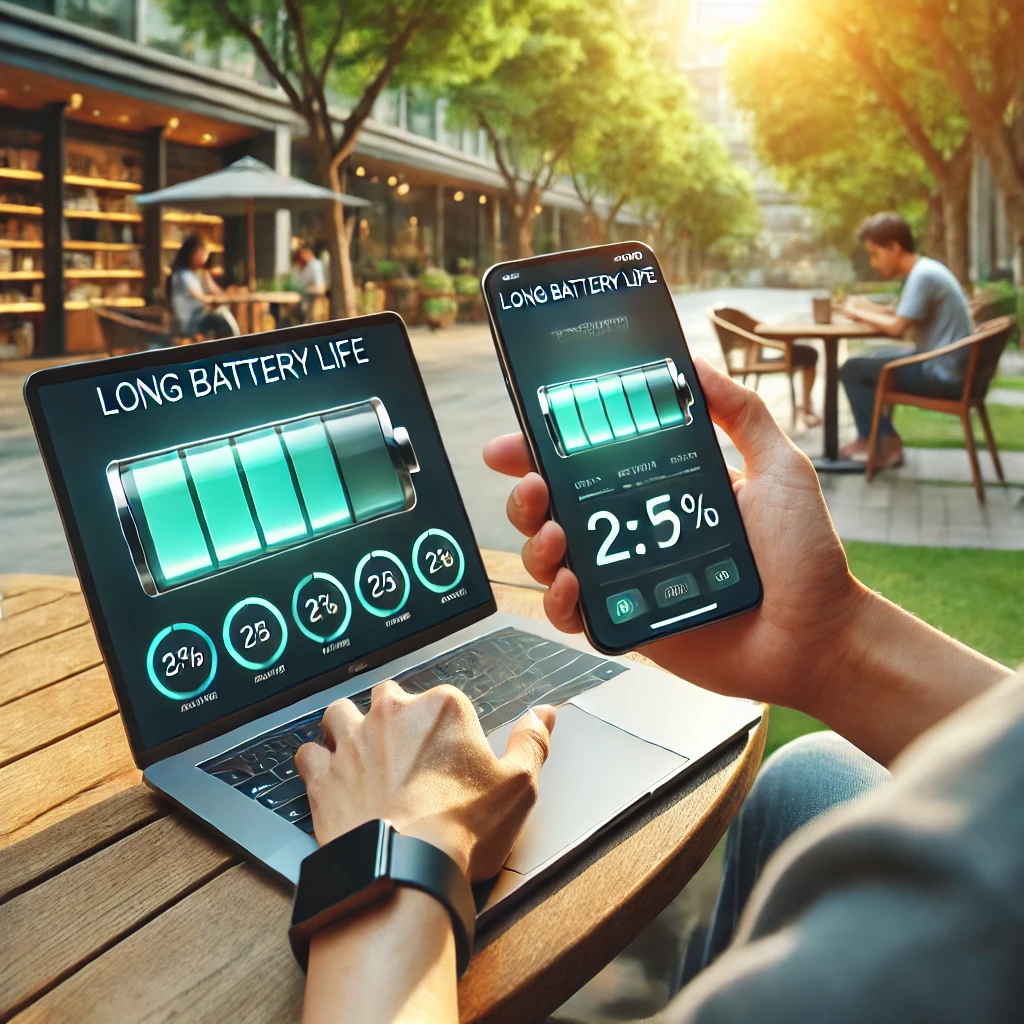The Importance of Battery Life in Mobile and Laptop Choice
When it comes to choosing a mobile device or laptop, one of the most crucial factors to consider is battery life. Whether you’re using the device for work, entertainment, or daily tasks, the length of time it can last without needing a recharge can significantly impact your overall user experience. Here’s a comprehensive look at the importance of battery life in mobile phones and laptops:

1. Convenience and Portability
A long battery life provides the freedom to use your mobile device or laptop throughout the day without constantly searching for an outlet. For those who are often on the go, this is particularly important. If you frequently travel or work remotely, you don’t want to be tethered to a charging station, as it limits your mobility. A device that lasts longer allows you to remain productive or entertained without interruption, making it ideal for professionals, students, or anyone who values convenience.
2. Productivity
For students, professionals, or anyone working from home, battery life can be a critical aspect of maintaining productivity. A laptop or mobile device with a weak battery may require frequent recharges, disrupting work flow. Devices with longer battery life allow users to complete tasks, attend virtual meetings, or browse without needing to worry about power draining unexpectedly. For people in fields like software development, content creation, or research, long-lasting battery life can ensure their tools are always ready when they need them.
3. Entertainment and Media Consumption
Many people use their mobile devices and laptops for streaming music, videos, or playing games. Battery life becomes especially important for users who consume media on the go, such as watching movies on a flight or gaming during travel. A device with a long battery life can provide an uninterrupted experience, which is crucial for maintaining enjoyment and reducing the stress of constantly monitoring battery levels.
4. Emergency Situations
A fully charged device can be crucial in emergency situations. Whether you need to make a call for help, access emergency services, or get directions, having a device with long battery life ensures you remain connected when it matters most. If your phone or laptop runs out of power during an emergency, you could find yourself in a difficult or even dangerous situation.
5. Energy Efficiency and Sustainability
As concerns over energy consumption and environmental impact grow, choosing devices with longer battery life can contribute to sustainability. Devices that require less frequent charging have a lower overall energy consumption, which can reduce your carbon footprint. Additionally, longer battery life can also extend the lifespan of a device, leading to less frequent replacements and a decrease in electronic waste.
6. Cost-effectiveness
A device with a short battery life might need more frequent charging, which can ultimately lead to faster battery degradation. This could result in the need for replacement batteries or even an entire device sooner than expected. On the other hand, a device with a longer battery life reduces the likelihood of needing costly repairs or replacements. In the long run, investing in a device with good battery performance can prove to be more cost-effective.
7. Advances in Technology
Mobile and laptop manufacturers are constantly improving battery technology. Innovations such as faster charging, more energy-efficient processors, and larger battery capacities have all contributed to improving battery life. Devices with longer battery life are not only more efficient but often come with other advanced features that enhance overall performance. For instance, some laptops or phones with long-lasting batteries also come with enhanced displays, improved processors, and additional features that improve both user experience and functionality.
8. The Trade-Off: Performance vs. Battery Life
One challenge that often arises when considering battery life is the trade-off between performance and power consumption. High-performance devices tend to consume more power, and while battery life may improve with newer technologies, users may find that pushing the device for demanding tasks such as gaming, video editing, or running resource-heavy applications can drain battery life quickly. It’s essential to balance your performance needs with the level of battery life that works best for you.
9. The Role of Battery Capacity and Optimization
When looking at a device’s battery life, it’s important to understand both the battery capacity (measured in mAh for mobile phones or Wh for laptops) and the device’s power optimization. Devices with larger batteries tend to last longer, but software and hardware optimization can play a significant role as well. Efficient software management, power-saving modes, and low-power processors can make a substantial difference in how long a device lasts, even with a smaller battery capacity.
Conclusion
Battery life is a critical factor in choosing both mobile phones and laptops, influencing everything from convenience and productivity to emergency preparedness and sustainability. When shopping for a device, it’s essential to consider how long you need the battery to last, taking into account your usage habits, device capabilities, and the trade-offs you may be willing to make. With advancements in battery technology, it’s easier than ever to find a device that strikes the perfect balance between performance and battery life, ensuring you stay connected, productive, and entertained wherever you go.

